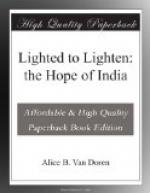Meenachi is twelve and the freedom of the long street is hers no more. Yellow chrysanthemums in her glossy hair, a special diet of milk and curds and sweet cakes fried in ghee, and the outspoken congratulations of relatives, male and female, mark her entrance into the estate of womanhood. What the West hides, the East delights to reveal.
Now follows the swift sequel of marriage. The husband, of just the right degree of relationship, has long been chosen. The family exchequer is drained to the dregs to provide the heavy dowry, the burdensome expenditure for wedding feast and jewels, and the presentation of numerous wedding garments to equally numerous and expectant relatives. Meenachi is carried away by the splendor of new clothes and jewels and processions, and the general tamash of the occasion. Has she not the handsomest bridegroom and the most expensive trousseau, of this marriage month? Is she not the envy of all her former playmates? Only now and then comes a strange feeling of loneliness when she thinks of leaving the dear, familiar roof the narrow street with its tamarind trees and many colored looms. The mother-in-law’s house is a hundred miles away, and the mother-in-law’s face is strange.
Will Meenachi be sad or happy? The answer is complex and hard to find, for it depends on many contingencies. The husband—what will he be? He is not of Meenachi’s choosing. Did she choose her father and mother, and the house in which she was born? Were they not chosen for her, “written upon her forehead” by her Karma, her inscrutable fate? Her husband has been chosen; let her make the best of the choice.
Will she be happy? The future years shall make answer by many things. Will she bear sons to her husband? If so, will her young body have strength for the pains of childbirth and the torturings of ignorant and brutal midwives? Will her Karma spare to her the life of husband and children? In India sudden death is never far; pestilence walks in darkness and destruction wastes at noon day. The fear of disease, the fear of demons, the fear of death will be never far away; for these fears there will be none to say, “Be not afraid.”
So Meenachi, the bride, passes out into the unknown of life, and later into the greater unknown of death. No one has taught her to say in the valley of the shadow, “I will fear no evil, for Thou art with me.” The terrors of life are with her, but its consolations are not hers.
[Illustration: Married to the god A Little Temple Girl]
Widowhood.
Of widowhood I shall say little. Since the ancient days of suttee when the wife mounted her husband’s funeral pyre volumes have been written on the lot of the Indian widow. To-day in some cases the power of Christianity has awakened the spirit of social reform and the rigors of widowhood are lessened. Among the majority the old remains. In general, the higher you rise in the social scale, the sterner the conventions and fashions of widowhood become.




